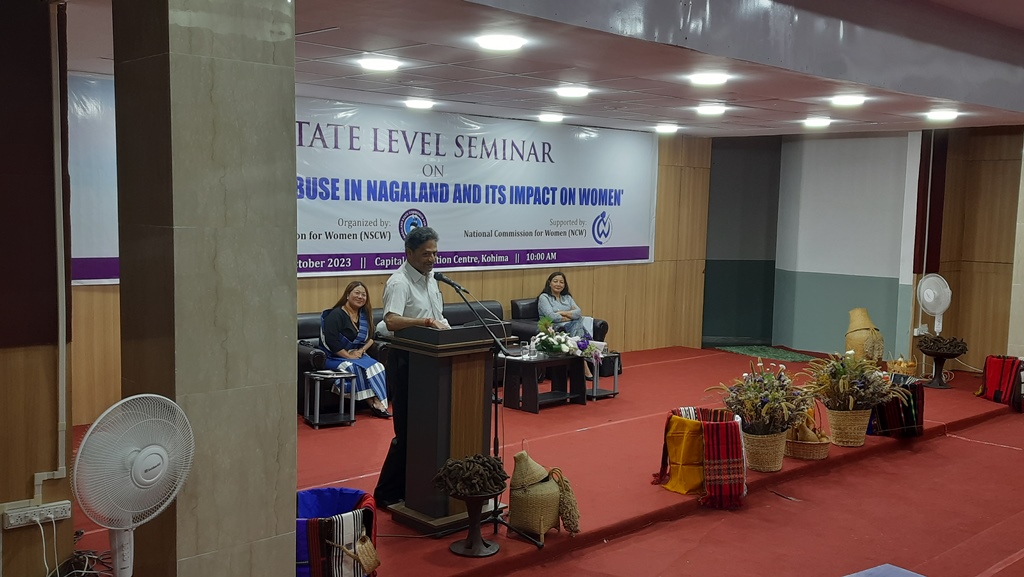Share

KOHIMA — Nagaland Director General of Police (DGP) Rupin Sharma on Thursday said that a lot of drug-related cases ultimately lead to women, at one point or the other, and cautioned women against allowing themselves to be "misused" by men.
There are a lot of women drug peddlers and traffickers in the state and women are being "misused" by men as police checking on women's bodies are less compared to men, the DGP said.
“Do not allow yourself or your body to be misused by men,” Sharma said.
The police chief was speaking during the state-level seminar on 'Substance abuse in Nagaland and its impact on women,' organised by the Nagaland State Commission for Women (NSCW) and supported by the National Commission for Women (NCW), held at Capital Convention Centre, Kohima.
[bsa_pro_ad_space id=1]Sharma also cautioned there is no mercy or leniency for women under the law, once caught.
He urged the families, tribes and individuals to help the police by not trying to bail out the criminals.
The police are not taking action against any family, tribe or gender but only acting against the criminals and there is no need for sympathy towards criminals, he asserted.
He also warned the CSOs, unions and individuals against taking the law into their own hands as their involvement in cases related to drugs is illegal, and will amount to “extortion” if they imposed fines on offenders.
Sharma also pointed out that rehabilitation and detox facilities in the state are of minimal capacity, with maximum accommodation of upto 650 persons only, while the police personnel who need rehabilitation are more than that.
He added the Police department is trying to improve the rehabilitation centres for its personnel.
To this end, the DGP requested the state government to convert empty spaces of government property into rehabilitation centres as an immediate solution.
[bsa_pro_ad_space id=1]Sharma also pointed out that people spend a lot of money to stay in rehab centres, which is one of the reasons why substance abusers do not avail the facilities.
He further appealed to the other government departments to initiate departmental action against the drug peddlers.
Joint Secretary of NCW, A Asholi Chalai, said that Nagaland has a history of substance use and alcohol consumption, and one such is the traditional brewed rice beer used for health and ritual purposes back then.
[bsa_pro_ad_space id=1]But now, it has been misused and people have normalised the commercialisation of rice beer, he said.
The availability and accessibility of drugs and alcohol have increased in the Northeast states including Nagaland, which borders Myanmar.
The states' machineries are not doing enough to tackle the drug menace in society today, according to Chalai.
In addition, there are cases where top politicians, army personnel police officers are also involved illegal drug business which, he said, is evident in the case of Manipur.
The NCW official also said that atrocities against women in the state with domestic violence on the top, is discouraging.
Marital rape is becoming rampant but women are not coming forward to lodge complaints because of the fear of social stigma, family's integrity and the criticisms, he said.
Chairperson of NSCW, W Nginyeih Konyak, said the seminar was conducted to have a comprehensive understanding of the prevalence and specific impact of substance abuse on women, which is a major social concern.
She called for a collaborative effort from all stakeholders to mitigate substance abuse, thereby improving the well-being of citizens in general and women in particular. She also appealed to law enforcement agencies, stakeholders and civil societies to work together in fighting against substance abuse for a brighter future generation.
Nginyeih said that substance abuse has societal repercussions and women are one of the vulnerable groups as they face unique challenges and risks as women are both affected and afflicted by it.
There is an issue of substance abuse by women on one hand and a burden felt by women as a result of drug abuse by someone in the family. There is a strong correlation between substance abuse and gender-based violence, particularly domestic violence. This creates a vicious cycle of trauma and substance misuse among women, she said.
She further pointed out that there is a growing need to address substance abuse among women. There are younger women who take alcohol to overcome domestic violence or family pressure and gradually become addicted to other substances including drugs.
During the technical session, experts from varied professional backgrounds also spoke on different topics.